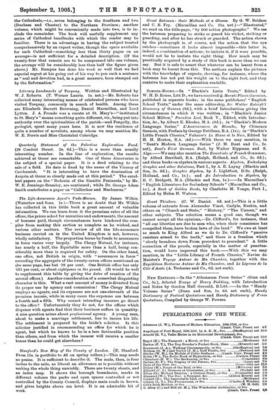. The Life - Assurance Agent's Vade - Mecum. By James Wilkie. (Waterlow and
Sons. 1s.)—There is no doubt that Mr. Wilkie has collected in this little book a great amount of valuable information. We can learn from it the premium rates of all the offices, the prices asked for annuities and endowments, the amount of bonuses paid, though circumstances have hindered the com- piler from making this section as complete as he wished, and various other matters. The review of all the life-assurance business carried on in the United Kingdom is not, however, wholly satisfactory. The proportion borne by funds to assurances in force varies very largely. The Clergy Mutual, for instance, has nearly a half, the Equitable more than a half, being con- siderably more than is required for safety. On the other hand, one office, not British in origin, with "assurances in force" exceeding the aggregate of the twenty-seven offices mentioned on the same page, has but '28 per cent. One British office has only .031 per cent, or about eightpence in the pound. (It would be well to supplement this table by giving the dates of creation of the several offices.) Another consideration of a somewhat disquieting character is this. What a vast amount of money is diverted from its proper use by agency and commission ! The Clergy Mutual employs no agents, and its expenses are not one-eleventh of the premium Weenie, while in many cases the expenses are between a fourth and a fifth. Why cannot intending insurers go direct to the office ? Unfortunately they do not, for the offices which dispense with agents find that their business suffers in quantity. A nice question arises about professional agency. A young man, about to make a marriage settlement, has to insure his life. The settlement is prepared by the bride's solicitor. Is this solicitor justified in recommending an office for which he is agent, but which he knows to be in a less favourable position than others, and from which the insurer will receive a smaller bonus than he could get elsewhere ?


































 Previous page
Previous page